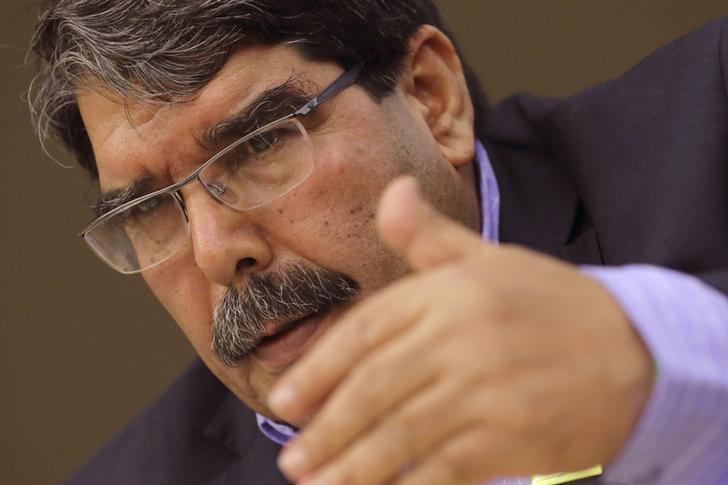London –The head of the Kurdish Democratic Union Party, Saleh Muslim, warned that Syria’s de-escalation zones, in their current formula, would lead to more fighting,.
He noted meanwhile that democratic federalism that is based on geographic factors was the guarantee for the country’s unity.
The tripartite agreement between Russia, Turkey and Iran to establish de-escalation zones would “only delay the conflict for a certain period of time,” he said.
“The current plan does not serve the interests of Syria,” he added.
In a phone interview with Asharq Al-Awsat, Muslim stressed that the Syrian people reject the division of their country.
He also said that the Syrian Democratic Forces (SDF), which also include the People’s Protection Units (YPG) and other Arab factions, were ready to fight terrorism “at any place and in any time”, adding in this regard that the agreement with Washington has prioritized the fight against ISIS.
Asked about the battle for Raqqa, Muslim said that the liberation of the city was crucial, as it has become a source of all terrorist activities in the Kurdish areas and northern Syria.
“Protecting civilians is the most important issue,” he stated, highlighting the role of the SDF in the progress achieved in the liberation of the ISIS stronghold.
Muslim underlined that each population center in Raqqa was administered and managed by a civil council. The SDF steered clear of residential areas and never tried to influence the council.
Asked about concerns over a Kurdish-Arab conflict and a social cleansing against the Arabs, the Kurdish official replied: “Foreign forces are trying to implement their agendas by instigating conflicts between the Kurds and Arabs; however, we do not see such things on the ground.”
“Arabs and Kurds live together in one house, in one village,” he said, adding that what is seen in the media was different from reality.
Muslim also ruled out any possibility to rebuild an alliance with the Bashar Assad Syrian regime.
On Iraq’s Popular Mobilization Forces, the Kurdish official noted that this was an Iraqi internal affair and that the Iraqi government has acknowledged them as part of its defense institution.
“It is their own affair, it has nothing to do with Syria,” he noted.
“In Syria, we have the SDF; we have Sunnis, Shi’ites and Kurds.”
However, Muslim warned that in case of an attack against Syria, his forces would respond appropriately to defend their areas.
Asked about relations with the United States, he commented: “The US side was truly committed to the SDF, while the Kurdish side was staunchly determined to fight terrorism.”
The result of US-Kurdish cooperation would be seen with the liberation of Raqqa, he elaborated.
On the Gulf crisis with Qatar, in particular the Turkish support to Doha, Muslim said that the deployment of Turkish forces in the Arab peninsula was foreign interference into the Arab countries’ affairs that would harm the Gulf society.
“Turkey is trying to achieve its Ottoman dreams and expand its rule over the region,” he stated.
“The dreams of [Turkish President Recep Tayyib] Erdogan have brought calamities to the Middle East and the region,” he added.
Muslim highlighted the need for Arab and Gulf states to reject any foreign interference in their area.
